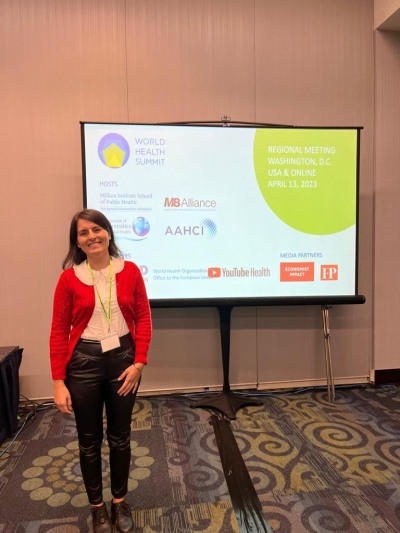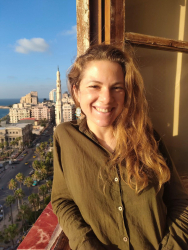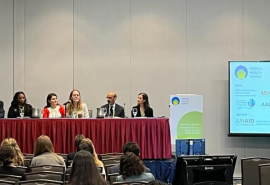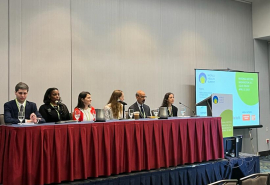


“Globalization brings us the opportunity to learn, virtually or in person. We take awareness of other realities in other parts of the world and we try to replicate in our country what we have learnt”. But globalization also “implies a challenge for colleagues from low- and middle-income countries to be at the same level and be competitive with colleagues from abroad. I came from a resources limited setting and sometimes it’s difficult to replicate what we have learnt”. So says Dr. Milagro Sanchez Cunto, an infectious disease specialist at the F.J. Muniz Hospital of Buenos Aires, Argentina. In 2022, Sanchez Cunto was selected to participate in IAP’s Young Physician Leaders (YPL) programme at the World Health Summit in Berlin, which she called “a privilege” and “unique opportunity to confront” herself.
At the 2023 World Health Summit Regional Meeting which took place on 13 April in Washington DC, she shared her experience in the panel ‘Emerging Leaders in a Globalized World’. The special session also included Ms. Alison Collard de Beaufort, Youth Leadership Board, Global Youth Coalition for Road Safety, Mr. Matthew Carvalho, Research Fellow, The O’Neill Institute for National and Global Health Law, Georgetown University Law Center, Ms. Torrine Creppy, President, Safekids Worldwide and Dr. Abdul Ghaffar, Senior Technical Advisor, JUNAID Family Foundation.
Dr. Sanchez Cunto underlined how dealing with the Covid-19 pandemic as a young physician in a public hospital in Argentina, “was a crucial event in [her] professional career”, which specifically highlighted the need for an emerging leadership. “We were traditionally accustomed to hierarchy but this situation urged a change in leadership style, as established leaders had to stay at home as they were at greater risk from the virus”, for example for fear of health implications related to age or previous illnesses. “We had the opportunity to emerge and found ourselves in leadership positions. It was overwhelming but we were able to readapt, to pay attention to every opinion, regardless of position, gender, or age. We were also able to share fears and doubts”.
On the strength of this experience, Sanchez Cunto details with conviction: an emerging leader is “passionate and always willing to learn”. S/he “can manage failure and is able to get back up on their feet”, but is also an “empathetic” individual who gives “power to team members and is sensitive to their needs. Leadership is not related to age or title or natural born features or any other quality, it’s more a choice for me.” A choice which is not always easy in medicine, a profession which is nowadays “full of women, but where the leader positions are occupied by men, mainly”, she points out. “There is no scarcity of well trained and well qualified women”, but while they constitute a majority of health workers, women hold few leadership roles. “Male stereotypes of having better leader qualities persist, but being perseverant is a good way to be heard”.
“I really enjoyed the panel session and learnt so much from my fellow panelists, too. I’m really grateful to IAP and the YPL programme for sponsoring my attendance in Washington DC,” she concluded.
Watch the full video recording of the session here.

Dr Milagro Sanchez Cunto participated in the panel ‘Emerging Leaders in a Globalized World’, at the 2023 World Health Summit Regional Meeting which took place on 13 April in Washington DC. It was the occasion to share her experience as a participant in IAP's 2022 Young Physician Leaders programme.
The special session also included Ms. Alison Collard de Beaufort, Youth Leadership Board, Global Youth Coalition for Road Safety, Mr. Matthew Carvalho, Research Fellow, The O’Neill Institute for National and Global Health Law, Georgetown University Law Center, Ms. Torrine Creppy, President, Safekids Worldwide and Dr. Abdul Ghaffar, Senior Technical Advisor, JUNAID Family Foundation.
 Dr Milagro Sanchez Cunto shared her experience in the panel ‘Emerging Leaders in a Globalized World’. The special session also included Ms. Alison Collard de Beaufort, Youth Leadership Board, Global Youth Coalition for Road Safety, Mr. Matthew Carvalho, Research Fellow, The O’Neill Institute for National and Global Health Law, Georgetown University Law Center, Ms. Torrine Creppy, President, Safekids Worldwide and Dr. Abdul Ghaffar, Senior Technical Advisor, JUNAID Family Foundation.
Dr Milagro Sanchez Cunto shared her experience in the panel ‘Emerging Leaders in a Globalized World’. The special session also included Ms. Alison Collard de Beaufort, Youth Leadership Board, Global Youth Coalition for Road Safety, Mr. Matthew Carvalho, Research Fellow, The O’Neill Institute for National and Global Health Law, Georgetown University Law Center, Ms. Torrine Creppy, President, Safekids Worldwide and Dr. Abdul Ghaffar, Senior Technical Advisor, JUNAID Family Foundation.
 Dr Milagro Sanchez Cunto shared her experience in the panel ‘Emerging Leaders in a Globalized World’. The special session also included Ms. Alison Collard de Beaufort, Youth Leadership Board, Global Youth Coalition for Road Safety, Mr. Matthew Carvalho, Research Fellow, The O’Neill Institute for National and Global Health Law, Georgetown University Law Center, Ms. Torrine Creppy, President, Safekids Worldwide and Dr. Abdul Ghaffar, Senior Technical Advisor, JUNAID Family Foundation.
Dr Milagro Sanchez Cunto shared her experience in the panel ‘Emerging Leaders in a Globalized World’. The special session also included Ms. Alison Collard de Beaufort, Youth Leadership Board, Global Youth Coalition for Road Safety, Mr. Matthew Carvalho, Research Fellow, The O’Neill Institute for National and Global Health Law, Georgetown University Law Center, Ms. Torrine Creppy, President, Safekids Worldwide and Dr. Abdul Ghaffar, Senior Technical Advisor, JUNAID Family Foundation.